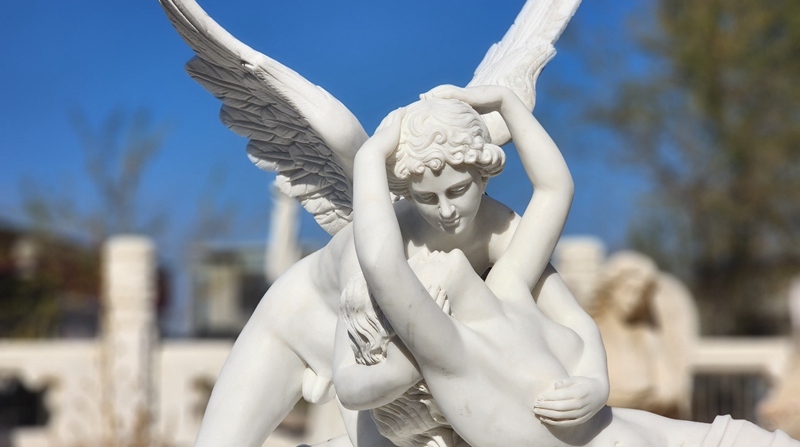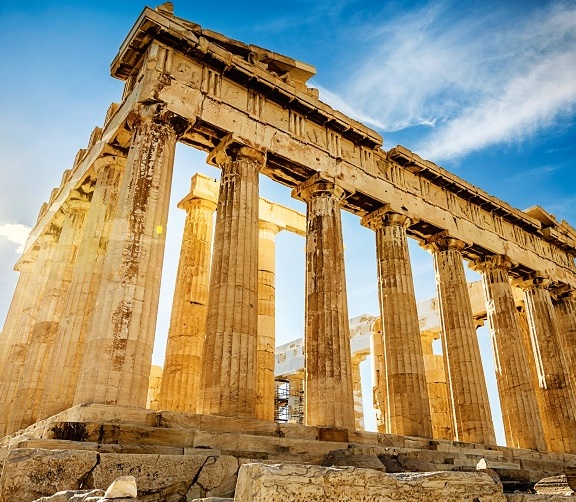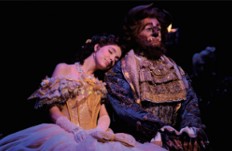
Think about the following questions.
1. What is a famous love story that you like? Why do you like it?
2. Are love and wisdom related?
3. What do you know about the story of Cupid and Psyche?
VOCABULARY PREVIEW
Match each New Academic Word List(NAWL) word with the correct definition.
- arrow
- comply _____
- bound _____
- consent _____
- deceive _____
- constrain _____
- a. to follow orders or directions
- b. to agree or give permission
- c. to control; to hold back
- d. a weapon with a pointed head that is shot from a bow
- e. to trick or lie to
- f. forced; compelled
CUPID AND PSYCHE

Venus, the Roman goddess of beauty and love, heard rumors of a mortal named Psyche, who many claimed was more beautiful than herself. Venus was filled with jealousy and ordered her son, Cupid, to shoot Psyche with one of his magic arrows. This would make her fall in love with the most hideous1 monster on Earth.
Cupid followed his mother's orders, but as he was taking aim at Psyche, his finger slipped. He pricked himself with the tip of his own arrow, causing him to immediately fall deeply in love with Psyche.
Cupid informed Psyche's family that it was the will of the gods for her to climb to a mountaintop and be united in matrimony with a terrible monster. Bound by duty to the gods, they complied.
When Psyche reached the mountaintop, it was dark, but she felt a warm wind and was suddenly transported to a magnificent2 palace. After a relaxing bath and a delicious meal, accompanied by melodious3 music that seemed to come from nowhere, Psyche fell asleep.
For the next several nights, Cupid visited her, secretly replacing the monster as her husband. He always arrived after dark and departed before dawn, forbidding4 her to look upon him. Though she could not see her new husband, Psyche consented to the arrangement and eventually fell in love with him. Cupid told her it was unnecessary to view his face, provided she loved and trusted him.
In time, however, Psyche found she could not constrain her curiosity. So one night, after Cupid had fallen asleep, she lit a lamp to illuminates5 his face. Upon seeing her lovely husband, her hand trembled6 with delight, causing a drop of hot oil to fall onto Cupid's shoulder, awakening him. Angrily, he said, “I loved you and asked only for your trust; but when trust is gone, so love must depart." With that, he flew back to Venus, who greeted her son with rage for deceiving her and imprisoned him in her palace.
As soon as Cupid deserted Psyche, the magnificent palace vanished7, leaving the poor girl alone on the cold peak. After wandering night and day in search of her lost love, Psyche finally approached the temple of Venus in desperation. There, the goddess agreed to help only if Psyche succeeded in a difficult task. She commanded the fearful maiden8, "Take this box and go to the underworld and ask the queen of that realm9, Proserpina, to put a little of her beauty in the box for you to bring back to me."
Psyche set off on her adventure, full of trepidation10. Suddenly she heard a voice, which commanded her to give a coin to Charon, the ferryman, who would take her across the river bordering the underworld. "Above all," said the voice, "once Proserpina has placed some of her beauty in the box, do not open it!"
Psyche obeyed, and after collecting a bit of beauty from Proserpina, she rushed to return the box to Venus. But once again, she could not control her curiosity, so she lifted the lid of the box and was immediately overcome by a deep and heavy slumber11.
Meanwhile, Cupid managed to escape the palace of Venus through a window, and no sooner had he flown outside than he saw Psyche's motionless body. He rushed to her side, embraced her, and lifted the heavy sleep from her body and placed it back into the box. He told her to carry it to Venus and promised to return shortly, at which time all would be well.
Overjoyed, Psyche hurried to fulfill her task while Cupid flew to Jupiter, the king of the gods, and begged him to bless his marriage to Psyche. Jupiter not only agreed but also granted Psyche immortality to match that of her husband. Thus, with the marriage of Cupid and Psyche, Love and the Soul (which is what "Psyche" means in Greek) were happily united at last.
New Academic Word List
- hideous 1 : adj. very ugly
- magnificent 2 : adj. very beautiful or impressive
- melodious 3 : adj. having a pleasing tune
- forbid 4 : v. to say that something is not allowed
- illuminate 5 : v. to brighten with light
- tremble 6 : v. to shake slightly because of strong emotion
- vanish 7 : v. to disappear without explanation
- maiden 8 : n. a young girl who is not married
- realm 9 : n. a land ruled by a king or queen
- trepidation 10 : n. fear and hesitation
- slumber 11 : n. sleep
READING COMPREHENSION
A ‣ Mark each statement as true (T) or false (F) according to the reading.
- Cupid made a mistake as he was trying to shoot Psyche.
- True
- False
- Psyche angered Cupid by looking at his face.
- True
- False
- Venus refused to help Psyche when she was searching for Cupid.
- True
- False
- Jupiter made Cupid mortal to match Psyche.
- True
- False
- Jupiter punished Cupid for disobeying his mother.
- True
- False
B ‣ Choose the best answer according to the reading.
- What is the main idea of the reading?
- a. Psyche destroyed Cupid's love for her by disobeying him.
- b. All of the gods agreed it was a mistake to try to trick Venus.
- c. Psyche simply could not follow directions and had to be rescued repeatedly.
- d. Cupid and Psyche had a troubled romance but lived happily together in the end.
- Why did Venus tell Cupid to shoot Psyche?
- a. She knew that Psyche wanted to marry her son, Cupid.
- b. Her pride was hurt because of Psyche's beauty.
- c. Psyche had fallen in love with a horrible monster.
- d. Mortals told her that Psyche wanted her advice.
- The word matrimony in paragraph 3 means _____.
- a. spirit
- b. magic
- c. heaven
- d. marriage
- Why did Cupid leave Psyche when they were in the palace?
- a. He did not like her face.
- b. She played a trick on him.
- c. He couldn't trust her anymore.
- d. He fell in love with Proserpina.
C ‣ Look for the answers in the reading and write them on the lines.
- What did Venus command Psyche to do when Psyche asked her for help?
_____ - Why were Cupid and Psyche able to live happily together in the end?
_____
SUMMARY
Fill in the blanks with the phrases in the box.
- betrays his trust
- overcome by curiosity
- Proserpina's beauty
- hideous monster
- becomes immortal
- hears rumors
The goddess Venus becomes jealous when she 1 _____ that a mortal named Psyche is more beautiful than she is. She sends her son Cupid to shoot Psyche with a magic arrow that will cause her to fall in love with a(n) 2 _____. Cupid descends to Earth, but his finger slips, and he pricks himself with his own arrow. This causes him to fall in love with Psyche, so he secretly becomes her husband instead of the monster. But when Psyche 3 _____ by looking at him, Cupid leaves her. Venus punishes Cupid but reluctantly agrees to help Psyche if she gets some of 4 _____ in a box. Psyche is 5 _____ again and falls asleep when she peeks into the box. But Cupid rescues her, they get married, and Psyche 6 _____ like Cupid.
VOCABULARY PRACTICE
Fill in the blanks with the words in the box. Change the form if necessary.
- arrow
- bound
- comply
- consent
- constrain
- deceive
- In some places, minors under the age of eighteen can get married if their parents _____ .
- Thomas could no longer _____ his emotions, and he began to cry.
- Doctors are _____ by oath to never knowingly harm their patients.
- Citizens are required by law to _____ with the reasonable commands of a police officer.
- The Mongols had _____ that whistled as they flew through the air, terrifying their enemies.
- Some salespeople try to _____ their customers about their products' quality.
SUPPLEMENTAL READING
Beauty Is in the Eye of the Beholder

The story of Cupid and Psyche is one of the most popular Greco-Roman myths, and it has led to several modern adaptations. One of the most famous is "Beauty and the Beast," a fairy tale in which the love of a beautiful girl transforms an ugly beast into a handsome prince.
Like Psyche, the girl in this story willingly goes to the home of a hideous monster who treats her well. Unlike Cupid, however, the beast is truly ugly, so the girl repeatedly refuses his offers of marriage. It is only at the end of the story, when the beast has died, that the girl's loving tears break an evil spell and magically transform him into a prince.
The child psychologist Bruno Bettelheim interpreted both stories as metaphors for the development of human consciousness. In his view, myths touch children at a deep level where their anxieties lie. For example, the theme of the monstrous husband assures children that their fear of intimacy with another person as something "beastly" is perfectly normal. As the story develops and the characters learn that their partner is a lovely person despite their appearance, so will children understand that frightening aspects of adulthood can be positive.
Thus, when the girl in "Beauty and the Beast" discovers that her "beast" is really a handsome prince-like Psyche when she discovers that Cupid is a god-she is reassured that romantic love is potentially beautiful. This is the first step in realizing that a healthy relationship is about more than attraction and that both partners must live full lives as equals to be truly happy.
Fill in the blanks with information from the reading.
- "Beauty and the Beast" is related to the story of "Beauty and the Beast" is related to the story of _____ .
- Children learn from the story that their fear of intimacy is _____ .
- In Bettelheim's view, the ending of "Beauty and the Beast" is really about a(n) _____ between two equals.






















Leave a comment
Load more